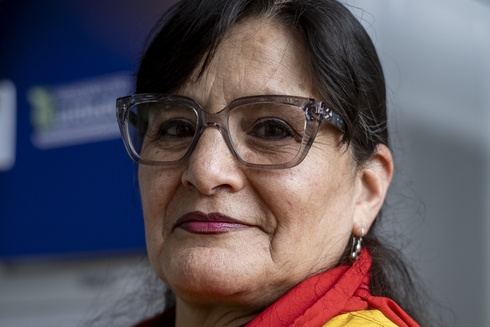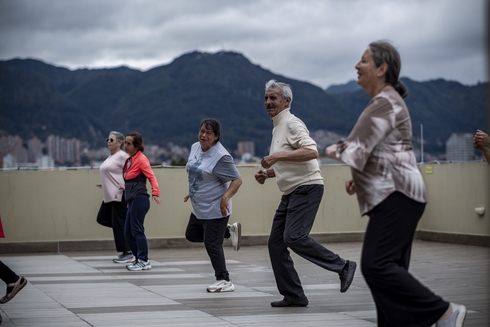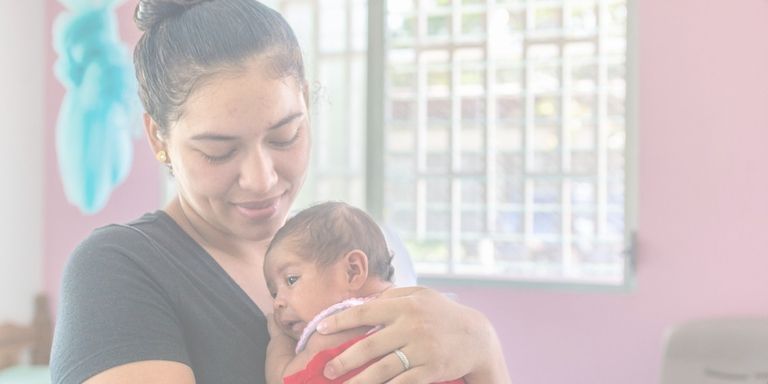
IDB Cares is the Inter-American Development Bank Group’s initiative targeted at increasing funding, technical cooperation, and generating knowledge to strengthen the governance and financing of comprehensive care systems, expanding high-quality care services, and fostering shared responsibility for care work.
Understanding the concept of care
Care encompasses all paid and unpaid work to ensure people’s physical, mental, and emotional well-being. It includes relational care activities such as childcare, care for dependent older persons, healthcare, household work, support for people with disabilities that require it and their caregivers, as well as self-care practices. Care can be provided by public or private organizations or by individuals (family members or hired caregivers).
Why invest in care?
Care is the foundation of thriving societies and economies. In Latin America and the Caribbean, most care work is unpaid and, valued at minimum wage, it represents 21% of the region's Gross Domestic Product.
Countries across the region face three challenges related to care
- Insufficient supply of quality services. Access to childcare remains below 5% in some countries and reaches a maximum of 40% in those with the highest coverage. The quality of these services in the region is low. In the case of long-term care, only 5% of older adults with care needs are covered by publicly funded services. Addressing this challenge requires investments in infrastructure and in the design and implementation of quality services.
- Overreliance on unpaid care work, mostly carried out by women. In Latin America and the Caribbean, there are approximately 23.7 million paid domestic workers and caregivers—14.8 million in domestic work and 8.9 million in paid caregiving roles for children, people with disabilities, and older adults. However, women in the region devote an estimated 8.4 billion hours every week to unpaid care work—equivalent to over 210 million women working full-time (40 hours per week) without pay.
- Latin America and the Caribbean are aging faster than any other region in the world. By 2050, one in four people will be over 60, totaling 195 million individuals. Because of this rapid aging, the number of persons with disabilities is also projected to double, reaching 150 million. For long-term care only, LAC will need 14 million caregivers by 2050—five times the size of today’s workforce.
Addressing care needs is an economic opportunity. Investing in care systems drives sustainable growth, boosts productivity, and reduces poverty and inequality. Expanding care services and infrastructure can generate new jobs—up to 350 million by 2035 globally—and increase individual agency, especially for women, unlocking their participation in the workforce, education, and civic life. It also can boost productivity by reducing work-absenteeism. For those receiving care, including children, older adults, and persons with disabilities, access to quality services can enhance well-being, reduce healthcare costs, and close gaps in education and labor market outcomes.
What we do
IDB Cares offers lending and technical assistance products tailored according to each client’s needs across three pillars:

to build high-quality care systems through improved institutional capacity, cross-sector coordination, regulatory frameworks, and sustainable funding models.

for children, older persons, and persons with disabilities, through public and private investment in infrastructure and in a dignified, professional and fairly paid care workforce, person-centered models.

by advancing policies and practices that foster equitable distribution of care work within families, communities, companies, and the public and private sectors.
What we offer
- Loans and financing: Public and private financing for care infrastructure and high-quality services: childcare centers, day-care centers, home-care services and residential services for older persons, support for persons with disabilities, accessible infrastructure, telecare systems, and others.
- Technical assistance: Expert advisory services on policies, workforce training, quality standards with monitoring and improvement processes, regulatory frameworks, and others.
- Applied knowledge and communities of practice: Evidence to inform investment decisions and knowledge networks to connect experts, policymakers, the private sector and entrepreneurs across the region.
- Innovation: Training and resources to develop tech-enabled, scalable care solutions.
- Partnerships: IDB Cares mobilizes alliances and resources to enable the advancement and consolidation of comprehensive care systems.
Projects
Support for the implementation of the Paraná Amigo da Pessoa Idosa program
This Technical Cooperation (CT) project aims to support the State Secretariat for Women, Racial Equality and the Elderly (SEMIPI) of Paraná, Brazil, in the development and implementation of some components of the Paraná Friend of the Elderly program, including: (i) the development of a registry of institutional long-term care services; (ii) caregiver training with a person-centered care approach; (iii) the development of a community-based care needs prevention strategy; and (iv) the design of an investment plan for this policy.
Aging Support Mechanism: Support for the creation of the elderly caregiver registry for the state of Paraná (Cadastro de cuidadores do Paraná)
This Technical Cooperation (TC) aims to design an electronic registry of elderly caregivers, a key component of the Paraná Amigo da Pessoa Idosa Program, promoted by the State Secretariat for Women, Racial Equality and the Elderly (SEMIPI) of Paraná, Brazil, and currently under parliamentary discussion. The registry will include unpaid and paid caregivers.
Support for the implementation of the National Care and Dependency System and the strengthening of Costa Rica's social information systems
Support the Government of Costa Rica in the implementation of a long-term care system, contributing to the development of components related to the system's institutionality, service quality, and integrated management of social-health information.
Support for the strengthening and expansion of Costa Rica's national care system
Improve the living conditions of care-dependent populations (elderly people with functional dependency and people with disabilities with high support needs), as well as the well-being of caregivers, through: (i) strengthening SINCA's institutionality through joint action of the institutions that make it up; and (ii) strengthening the coverage and quality of dependency care services and caregiver support.
Social Inclusion and Development Program Phase II
The general objective is to contribute to reducing the vulnerability of the Panamanian population. The specific objectives are: (i) strengthen the coverage of the National Beneficiary Registry (RENAB); (ii) increase the social and productive inclusion of rural and indigenous women; (iii) improve the coverage and quality of Early Childhood Development (DIT) services; and (iv) contribute to the expansion of a comprehensive care system.
Program to Support the Strengthening and Sustainability of the National Care System
The general objective of the program is to contribute to improving access to quality care for people with disabilities and people in dependency situations. The program will have three specific objectives: (i) Promote access to quality care for children with disabilities in dependency situations in educational settings, including migrant population; (ii) Improve the quality of home care for people in severe dependency situations and the quality of employment for caregivers, including migrant population; and (iii) Improve the management capacity and long-term planning of the National Integrated Care System (SNIC).
Support for the implementation of the Paraná Amigo da Pessoa Idosa program
This Technical Cooperation (CT) project aims to support the State Secretariat for Women, Racial Equality and the Elderly (SEMIPI) of Paraná, Brazil, in the development and implementation of some components of the Paraná Friend of the Elderly program, including: (i) the development of a registry of institutional long-term care services; (ii) caregiver training with a person-centered care approach; (iii) the development of a community-based care needs prevention strategy; and (iv) the design of an investment plan for this policy.
Aging Support Mechanism: Support for the creation of the elderly caregiver registry for the state of Paraná (Cadastro de cuidadores do Paraná)
This Technical Cooperation (TC) aims to design an electronic registry of elderly caregivers, a key component of the Paraná Amigo da Pessoa Idosa Program, promoted by the State Secretariat for Women, Racial Equality and the Elderly (SEMIPI) of Paraná, Brazil, and currently under parliamentary discussion. The registry will include unpaid and paid caregivers.
Support for the implementation of the National Care and Dependency System and the strengthening of Costa Rica's social information systems
Support the Government of Costa Rica in the implementation of a long-term care system, contributing to the development of components related to the system's institutionality, service quality, and integrated management of social-health information.
Support for the strengthening and expansion of Costa Rica's national care system
Improve the living conditions of care-dependent populations (elderly people with functional dependency and people with disabilities with high support needs), as well as the well-being of caregivers, through: (i) strengthening SINCA's institutionality through joint action of the institutions that make it up; and (ii) strengthening the coverage and quality of dependency care services and caregiver support.
Social Inclusion and Development Program Phase II
The general objective is to contribute to reducing the vulnerability of the Panamanian population. The specific objectives are: (i) strengthen the coverage of the National Beneficiary Registry (RENAB); (ii) increase the social and productive inclusion of rural and indigenous women; (iii) improve the coverage and quality of Early Childhood Development (DIT) services; and (iv) contribute to the expansion of a comprehensive care system.
Program to Support the Strengthening and Sustainability of the National Care System
The general objective of the program is to contribute to improving access to quality care for people with disabilities and people in dependency situations. The program will have three specific objectives: (i) Promote access to quality care for children with disabilities in dependency situations in educational settings, including migrant population; (ii) Improve the quality of home care for people in severe dependency situations and the quality of employment for caregivers, including migrant population; and (iii) Improve the management capacity and long-term planning of the National Integrated Care System (SNIC).
Publications

The report quantifies the rising demand for long-term care workers in one of the most rapidly aging regions worldwide. It highlights the precarious working conditions of paid care workers, the consequences of caring for unpaid carers as well as the limited training opportunities and the particular burden on women for both groups of workers. It also describes policies and best practices to support family caregivers, expand and professionalize the care workforce, and build more resilient care systems for the Latin American and the Caribbean region, also building on the experience of OECD countries.

This note presents the definition, relevance, and objectives of a care system from the perspective of both care recipients and providers. It also outlines a menu of care interventions for targeted populations throughout peoples life cycle and highlights policy areas where the Inter-American Development Bank (IDB) can support the sector throughout Latin America and the Caribbean. The note is organized as follows. After an introduction, Section 2 discusses the objectives, institutional organization, and financing of care systems. Section 3 analyzes the subsystems that provide care services for children, people with disabilities, and older people with care needs, describing key interventions or policies where IDB can help countries in the region strengthen their care system activities. Finally, Section 4 presents programs and policies focused on caregivers and the IDBs work in this area.

Conciliation and co-responsibility for care is one of the eight dimensions of the Guide to promote gender equality in Latin American and Caribbean companies. This guide aims to provide direction to the business sector in designing and implementing measures that promote equal opportunities for men and women in workplace environments. It includes evidence, supporting tools, and both regional and international case studies. Additionally, it offers clear roadmaps with flexible recommendations adaptable to diverse business contexts and needs.

Investing in the first five years of life is essential for early childhood development (ECD) and contributes to increasing societal productivity, reducing poverty, and promoting equality. Socioeconomic and ethnic gaps in ECD levels are evident from an early age, and by the start of primary school, they are substantial and can exacerbate inequalities later in life. This document provides an overview of the Sector Framework Document, which presents actions that impact ECD levels, particularly among the most vulnerable groups, and therefore help close these gaps.

Approximately one in seven people in Latin America and the Caribbean live with a disability, yet barriers and needs are often overlooked, and policies intended to foster inclusion remain understudied. This report examines the effectiveness of disability inclusion policies across education, health, labor markets, and social protection.
A network that supports countries and increases their institutional and technical capacity in long-term care services.
A partnership that finances, designs, implements, and evaluates innovative and scalable approaches that targets children aged zero to five in the region’s most disadvantaged populations.
Sistemas integrales de cuidados en América Latina y el Caribe on Vimeo

